Total Chaos: Exploring the pedagogical and ludographic possibilities of a mathematical card game
Corresponding Author: Ben Dyson
All authors:
Length: 60 minutes
Location:
Description:
The ‘gamification of science’ implements aspects of game design into scientific paradigms, in an attempt to overcome the pitfalls associated with laboratory-based data collection (eg, Long et al, 2023). The ‘scientification of games’ provides a complementary route, where novel insights into behavioral science are derived from the study of commercially developed games (eg, Dyson & Baik, in press). Natural intersections for these two approaches are lifelong STEM topics such as mathematics. Two aspects of maths literacy that have received empirical attention are the understanding of zero (Krajcsi et al., 2021) and negative numbers (Fuadiah et al., 2017). Importantly, there is growing evidence that the detrimental impact of maths anxiety may be offset by gamification (Barroso et al., 2020).
In this session, I will briefly contextualize a card game prototype (Total Chaos) that sits between commercial game and scientific paradigm. The majority of the session will involve direct participation from the attendees, by playing various iterations of the game. I will demonstrate the novel, modular rule system implemented in Total Chaos, allowing the game to be up-scaled or down-scaled according to the educational level of the players. At first, attendees will practice the game with the single core mechanic of the game. Next, I will add additional mechanics to the game creating an ‘action chain’ that increases both player interaction and strategy dynamics.
In addition to playful analog interactions during the session, anonymized feedback is also welcomed regarding the future directions of this prototype via the on-line, real-time platform of Mentimeter. The session will conclude with an informal discussion of how games like Total Chaos have the capabilities to teach, train and even measure concepts related to mathematical ability, theory-of-mind, and executive function. In these respects, attendees will have an appreciation of how the ‘gamification of science’ and ‘scientification of games’ approaches feed into one another, enabling a positive feedback loop for improving the quality of both education and games across the lifespan.
References, web links and other resources:
Digital resources for Total Chaos (rules video, Tabletopia link, FAQ)
https://sites.psych.ualberta.ca/recognitionlab/total-chaos/
‘Scientification of games’ approach
Dyson, B. J. & Baik, L. (in press). The scientification of games: Analysing the card game Ghost Blitz through the lens of Cognitive Psychology. Analog Game Studies.
(pre-print https://osf.io/preprints/psyarxiv/r6eh7)
Re:Cognition Lab Lab Website
https://sites.psych.ualberta.ca/recognitionlab/
